Before we look forward to 2023, let’s look back at all that we achieved in 2022.
We launched new tools to help universities and individuals explore paths to sustainability.
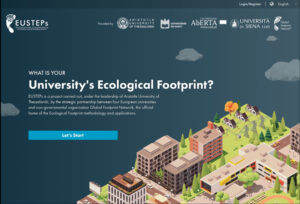 The first ever online Footprint Calculator for Universities was launched as part of the EUSTEPs project. The project brought together four European universities and Global Footprint Network to deliver tools designed to enhance sustainability teaching and practices in higher education. 108 universities from 22 countries have already used the Calculator to begin designing their sustainability strategy and policies.
The first ever online Footprint Calculator for Universities was launched as part of the EUSTEPs project. The project brought together four European universities and Global Footprint Network to deliver tools designed to enhance sustainability teaching and practices in higher education. 108 universities from 22 countries have already used the Calculator to begin designing their sustainability strategy and policies.- The interactive Food Footprint Platform was launched at the Terra Madre event in Turin, Italy. Visitors to our educational exhibition on Food Systems Sustainability learned about how their food choices impact Earth’s regeneration.
We pioneered a new approach to assess the impact that a company’s goods and services have on the global Ecological Footprint.
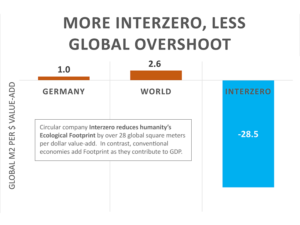 We calculated that German waste-management company Interzero shrinks humanity’s Ecological Footprint by 28 global square meters for each dollar of value it adds to the economy (calculated as wages and salaries including insurance + depreciation + profits before taxes). In comparison, the global economy adds, on average, 2.6 global square meters of Footprint for every dollar generated by the world economy per year.
We calculated that German waste-management company Interzero shrinks humanity’s Ecological Footprint by 28 global square meters for each dollar of value it adds to the economy (calculated as wages and salaries including insurance + depreciation + profits before taxes). In comparison, the global economy adds, on average, 2.6 global square meters of Footprint for every dollar generated by the world economy per year.
Our work received front-stage recognition.
- Global Footprint Network’s co-founder Mathis Wackernagel, Ph.D., and Director of Mediterranean and MENA Regions Alessandro Galli, Ph.D., were among the top 2% of cited scientists, according to research from Stanford University. In addition, Wackernagel was recognized for his contributions to sustainability with an honorary degree from the University of Stirling in Scotland.
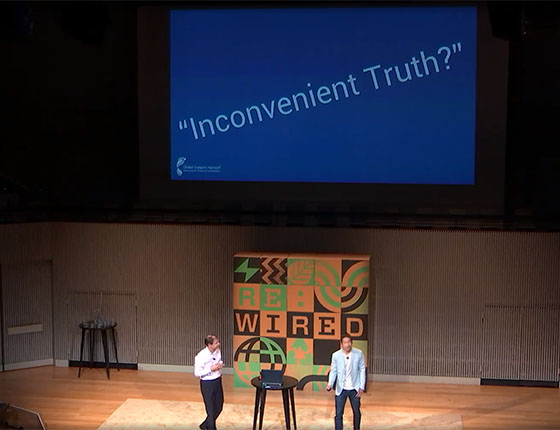 Chief Science Officer David Lin and Mathis Wackernagel presented at the world-famous hybrid event RE:WIRED Green. They discussed which businesses will be valuable in the predictable future of climate change and resource constraints. Watch them demonstrate several of our online resources, including the upgraded Footprint scenario tool, in the event recording.
Chief Science Officer David Lin and Mathis Wackernagel presented at the world-famous hybrid event RE:WIRED Green. They discussed which businesses will be valuable in the predictable future of climate change and resource constraints. Watch them demonstrate several of our online resources, including the upgraded Footprint scenario tool, in the event recording.- The Earth Overshoot Day launch was hosted by a country for the very first time. Ecuador’s Minister of Environment, Water, and Ecological Transition Gustavo Manrique presided over the event with guest-of-honor Mathis Wackernagel, while ministers around the world supported this first-of-its-kind event with video statements.
- The Dutch Overshoot Day report we developed with local partners was presented to the Dutch King and Agricultural Minister, as seen in this video at 1’17”.
We grew our involvement with government agencies.
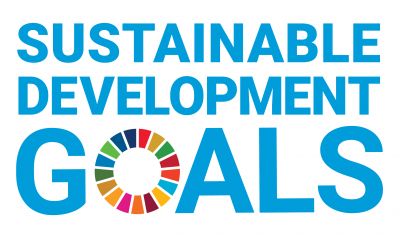 The Ecological Footprint was included as an impact indicator for monitoring the 2030GreenerMED Agenda’s Thematic Axis 1, which “support[s] the transition to a green, circular and socially inclusive economy based on sustainable consumption and production practices and nature-based solutions”. The Agenda was designed to contribute to achieving the Environmental SDGs in the Mediterranean.
The Ecological Footprint was included as an impact indicator for monitoring the 2030GreenerMED Agenda’s Thematic Axis 1, which “support[s] the transition to a green, circular and socially inclusive economy based on sustainable consumption and production practices and nature-based solutions”. The Agenda was designed to contribute to achieving the Environmental SDGs in the Mediterranean.- Global Footprint Network belongs to the Consortium that, under the coordination of NIVA (the Norwegian Institute for water research), was granted the operation of the European Topic Center on Biodiversity and Ecosystems (ETC BE) for the period 2023-2026.
The Ecological Footprint and its many applications were published in multiple peer-reviewed journals.
- Research by Global Footprint Network and partner organizations highlighted the Footprint’s usefulness for decision-making in the tourism industry. “Ecological Footprint and tourism: Development and sustainability monitoring of ecotourism packages in Mediterranean Protected Areas” was published in the Journal of Outdoor Recreation and Tourism.
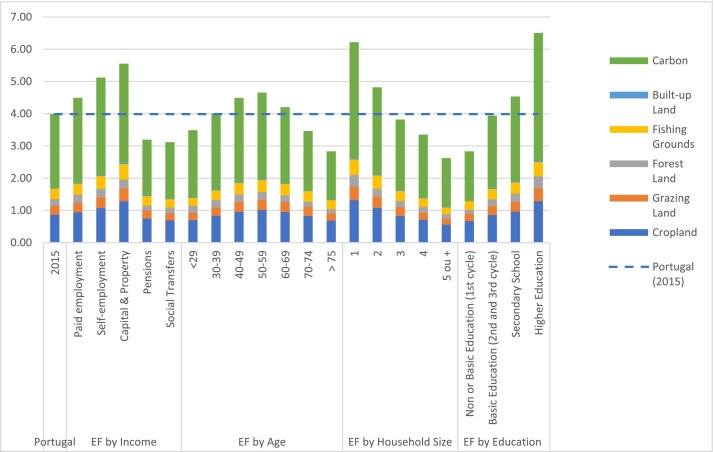 A research collaboration with several Portuguese academics led to one of the first published papers investigating how income, age, gender, education, etc. affect the resource requirements of a country’s (Portugal in this case) residents. “Supporting national-level policies for sustainable consumption in Portugal: A socio-economic Ecological Footprint analysis” was published in Ecological Economics
A research collaboration with several Portuguese academics led to one of the first published papers investigating how income, age, gender, education, etc. affect the resource requirements of a country’s (Portugal in this case) residents. “Supporting national-level policies for sustainable consumption in Portugal: A socio-economic Ecological Footprint analysis” was published in Ecological Economics- Our work on ecotourism earned us an encyclopedia entry on “Footprint and Tourism”.



